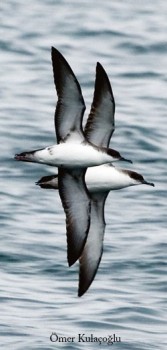Doğa, the partner of BirdLife International in Turkey, reported on its website and Facebook page yesterday of Vulnerable Yelkouan Shearwaters Puffinus yelkouan being caught by Istanbul recreational fishers by rod and by hand line with “tens of individuals” being caught from the shoreline over the last two days (click here for stills and video clips of the incident). The NGO and other volunteers have been working with the fishers to disentangle the hooked birds and release those still alive. For the last five days, tens of thousands of Yelkouan Shearwaters have been observed foraging in the centre of Istanbul.

Despite the regular passage migration of Yelkouan Shearwaters through the Bosphorus and past Istanbul (click here) this is the first time birds have been observed to be caught in this manner. Fortunately Doğa has further reported that the “massacre” has ended. “The hand-line fishing in Arnavutköy was stopped by municipal police officers of Beşiktaş Municipality. Many thanks to all bird watchers and nature lovers to make this success happen”. It seems from posted photographs that the municipal police confiscated the fishing equipment being used (click here).
This seems to be a novel threat faced by Yelkouan Shearwaters and perhaps by all procellariiforms. It seems likely that it will remain a rare event given that tubenose seabirds tend to be pelagic by nature, often foraging out of the sight of land, let alone within casting distance of recreational fishers on the sea’s shoreline*.
The Yelkouan Shearwater has been identified as a potential candidate for listing within the Albatross and Petrel Agreement.
John Cooper, ACAP Information Officer, 26 April 2018
*However, I have observed Fluttering Shearwaters P. gavia (Least Concern) foraging immediately next to wooden piers on Wellington’s harbour shoreline in New Zealand.
John Cooper, ACAP Information Officer, 26 April 2018

 English
English  Français
Français  Español
Español